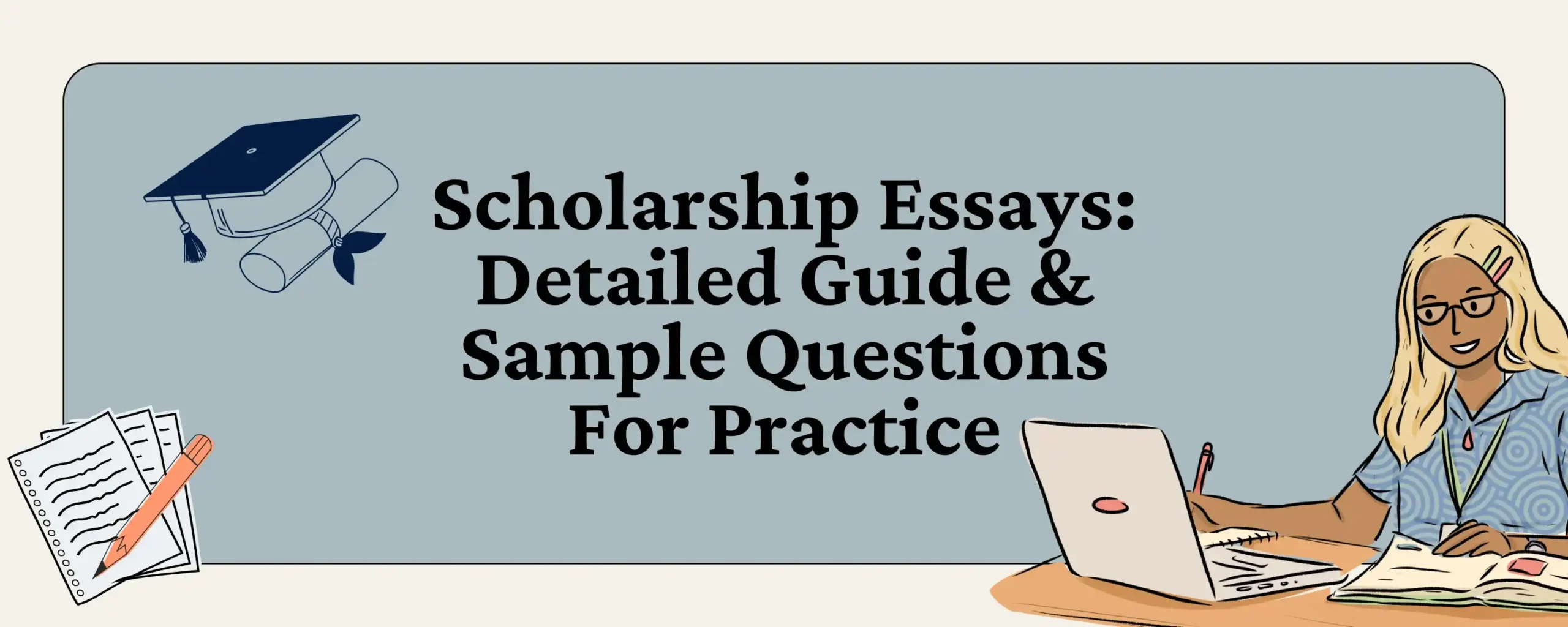“If you had just 500 words to change your future, what would you say?”
That’s exactly what you need to do to get a scholarship. A lot of scholarships require essays for you to be considered, so you’ll want to write one that shows how you are the best fit for that money. No doubt it’s the hardest part of your scholarship application. But it’s also the part of the application where the ‘real you’ can shine through. Unlike regular academic essays that focus on theories or research, this one is all about you: your story, dreams, and what makes you unique. So, get ready to make an impact on the selection committee with this clear, easy-to-follow steps to write a winning essay
Why Are Scholarship Essays Important?
Scholarship essays give committees a glimpse of you beyond grades, test scores, or resumes. While academic records show your capability, essays reveal your personality, passion, and potential. They are the single best way to showcase your qualities that can’t always be measured in numbers. In a sea of high grades and impressive test scores, your essay can help you stand out from the crowd. And especially when many candidates are equally qualified, you can influence a selection committee’s decision with a strong essay. It can be the deciding factor between receiving that funding or not.
It’s a small space but has the power to open big doors, not only to educational opportunities but also to networking and career growth. Door that might have otherwise been closed. Simply put, your essay is your voice and your opportunity to connect with the decision-makers. The better you communicate your authenticity and purpose, the higher your chances of success. So let’s improve your chances of success with these winning scholarship essay tips.
Understand the Prompt Before You Begin
Before you even think about writing, stop. Take your time to read and re-read the prompt as many times as you need to understand it. As it is not just prompt; it’s a direct instruction from the scholarship provider on what they want to know from you. Especially look for keywords like describe, explain, or share to identify what the committee is truly looking for. Many students lose points not because their essay is bad, but because it doesn’t actually answer the question.
Next, do a little detective work. Research the scholarship provider’s mission and values. What causes do they care about? What kind of students have they supported in the past? By understanding their goals, you can tailor your essay and to show how your own values and aspirations perfectly align with theirs. This shows you’re not just applying for money, but that you genuinely connect with their mission. For example, if a scholarship supports community service, highlight your volunteer work and its impact.
Plan Your Essay Structure
Good writing starts with good planning. A scholarship essay needs to be thought out well before you get to writing it. So, start by brainstorming some ideas, jot down themes you want to cover and then create a simple outline with a clear flow. It’s always easier to write when you have an idea of what you want to say.
There is no particular structure for a scholarship essay. The essay structure can be adjusted according to the writing style and content. For most scholarship essays, you can follow this outline to make your pre-writing process easier:
- Introduction: Hook the reader and introduce your purpose.
- Body: Present key points supported by strong examples.
- Conclusion: A powerful summary of your main points and a forward-looking statement.
Stick to the outline to keep your essay concise and to the point. Avoid unnecessary words and phrases. Scholarship committees often have to read many essays, so a clear and concise essay is more likely to stand out. Remember, clarity beats complexity every time.
Following an outline keeps your thoughts organized and prevents your essay from becoming scattered. Planning saves you time and ensures you create a high-quality, polished piece of writing.
Writing an Engaging Introduction
As we say “First impressions are last impressions”, your introduction is like the first impression so it has to be good. Start with an attention-grabbing hook to pull the reader in. This could be a powerful quote, a short, personal anecdote, or a surprising fact. Then, clearly state your essay’s purpose and what you’ll be discussing. Be sure to avoid clichés or overused opening lines that might bore the committee. For example, instead of writing, “I want this scholarship to pay for college,” you could begin with a story about the moment you discovered your passion for your chosen field. Most importantly, show genuine enthusiasm for the scholarship and the opportunities it offers. An authentic start sets the tone for the rest of your essay.
Developing the Body with Strong Examples
The body paragraphs are where your unique story comes to life. This is where you convince the scholarship committee of why you are deserving of the scholarship. So don’t just tell the committee about your qualities; show them by using personal stories and achievements as evidence. For example, instead of saying, “I have great resilience,” you could describe a specific time you faced a difficult challenge and the steps you took to overcome it. This makes your claims believable and memorable.
Another point to keep in mind is to connect your personal experiences directly to the scholarship’s objectives. If the scholarship is for future community leaders, share a moment when you led a team to success. Keep each paragraph focused on a single point to ensure it is impactful and easy to follow. Remember, it’s not just about what you did, but what you learned from it and how that experience shaped you.
Crafting a Memorable Conclusion
Your conclusion is the last thing the committee will read, so it needs to be powerful. It should summarize the main points you’ve made without simply repeating the introduction. Highlight why you are the right candidate for the scholarship, reminding them of your passion, qualifications, and potential. End with a memorable, inspiring, or forward-looking statement that leaves a lasting impression. You could talk about how the scholarship would help you achieve your goals and how you plan to give back to your community in the future. A strong conclusion should tie all your ideas together and make the committee feel confident in their choice to select you.
Common Mistakes to Avoid in Scholarship Essays
Even the most brilliant essays can be ruined by simple errors. Here are some common mistakes to watch out for:
- Generic Responses: Avoid general or vague statements that could apply to anyone. Your essay must be personal and unique to you.
- Grammatical Issues: Typos and grammatical errors show a lack of care. Proofread your work multiple times.
- Copying Templates: Don’t use pre-written templates or overused quotes. The committee wants to hear your original voice, not a recycled one.
- Ignoring Guidelines: Always follow the instructions, especially word limits and formatting. Not doing so shows you can’t follow directions.
- Over-exaggeration: Be authentic. While you want to highlight your strengths, avoid making up stories or exaggerating your accomplishments.
Editing and Proofreading Tips
You’ve written a great essay, but you’re not finished yet! Editing and proofreading are critical steps. After you finish your draft, take a break. A few hours or even a day will give you fresh eyes to spot mistakes you might have missed. Read your essay aloud to check the flow. Does it sound natural? Are there any awkward phrases? Use editing tools like Grammarly to catch basic errors, but don’t rely on them completely. Finally, have a trusted friend, teacher, or family member read your essay. A second opinion can help you find errors and improve clarity. Remember, multiple revisions are the key to a polished, high-quality essay.
How to Make Your Essay Stand Out?
Standing out is all about being authentic and showing your unique voice. Your essay should feel like a conversation with the committee, not a stiff report. Align your personal story with the scholarship’s mission, showing them that your goals and their values are a perfect match. Use vivid descriptions to paint a picture with your words, but avoid exaggeration. Keep the language professional but also conversational, avoiding jargon that might sound forced. Your goal is to make the reader feel like they know you a little better. Remember, selection committees read hundreds of essays. A genuine, well-crafted one will always stand out.
Sample Scholarship Essay Questions
To make your preparation easier, here are a few most common scholarship questions:
- Describe a challenge you overcame and what you learned from it.
- How will this scholarship help you achieve your academic and career goals?
- Share an experience where you demonstrated leadership.
- Explain how your background has shaped your aspirations.
- Discuss a time you made a meaningful impact in your community.
Practicing your answers to these questions will help you refine your writing skills and prepare strong responses for your actual scholarship applications.
Writing a scholarship-worthy essay can help you secure the most rewarding grants. So put in the effort to personalize your writing, follow these steps, and express your true self. We hope you’re able to better understand how scholarship essays are written and what methods you need to use to write an essay that makes the scholarship committee choose your essay as the winner. Every draft brings you closer to your dream. Go for it!
Frequently Asked Questions
1. How Long Should a Scholarship Essay Be?
Ans: Most scholarship essays are between 500–1,000 words, unless the instructions say otherwise. Always check the word limit mentioned by the scholarship committee and stick to it. Writing too little may make your essay look incomplete, while writing too much can lose the reader’s attention. The key is to be clear, concise, and impactful.
2. Can I Use the Same Essay for Multiple Scholarships?
Ans: Yes, but with caution. You can use the same base essay for different scholarships, but make sure to customize it for each one. Every scholarship has its own goals, values, and criteria. Adjust your examples, experiences, and tone to match what they are looking for. A copy-paste essay usually feels generic and won’t stand out.
3. What Makes a Scholarship Essay Stand Out?
Ans: A winning essay is one that feels authentic, personal, and memorable. Instead of just listing achievements, share your story—the challenges you faced, the lessons you learned, and your vision for the future. Use a natural flow, simple language, and show your passion. Committees read hundreds of essays; what makes yours shine is your unique voice and honesty.
4. Do I Need to Mention Financial Need in Every Essay?
Ans: Not always. Some scholarships are based on merit (skills, academics, leadership, community work), while others focus on financial need. If the scholarship doesn’t ask about financial background, you can skip it and highlight your strengths, goals, and achievements instead. Mention financial need only when it’s relevant to the scholarship’s purpose.





